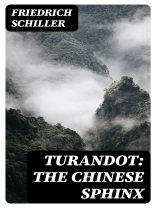Friedrich Schiller’s 'Turandot: The Chinese Sphinx’ presents a captivating exploration of the titular character’s complex psyche against a backdrop of East Asian culture and philosophy. Written in a dramatic form characteristic of Schiller’s rich aesthetic style, the play is infused with elements of romanticism and idealism, reflecting the thematic tensions between love, power, and identity. Drawing on an array of influences, from classical philosophy to Eastern narratives, Schiller reinterprets the story of Turandot to interrogate the nature of human emotion and societal expectations, elevating it to a universal commentary beyond its exotic locale. The esteemed German playwright and poet, Friedrich Schiller, was a contemporary of Goethe and a pivotal figure in the Sturm und Drang movement. His deep engagement with philosophical ideas surrounding freedom, morality, and the human spirit often found expression in his literary works. Schiller’s exposure to various cultural and philosophical discourses, along with his own personal struggles, undoubtedly shaped his interpretation of Turandot, allowing him to weave intricate layers of meaning into the narrative that resonate with both contemporary and timeless themes. 'Turandot: The Chinese Sphinx’ is highly recommended for readers who appreciate the intersections of cultural motifs and philosophical inquiries within the realm of dramatic literature. This work not only serves as a testament to Schiller’s literary prowess but also invites readers to reflect on the complexities of identity and the interplay of power and love. It is an essential read for those interested in the rich tapestry of European literature influenced by exotic narratives.
O autorze
Johann Christoph Friedrich von Schiller (1759–1805), more prominently known as Friedrich Schiller, was a seminal German poet, philosopher, historian, and playwright, whose influence extended throughout the literary landscape of his time and beyond. Schiller’s contributions to the literary canon are marked by an impassioned lyricism and a deep engagement with the aesthetic and moral consciousness of humanity. 'Turandot: The Chinese Sphinx’ is one of the remarkable works that exhibit Schiller’s dramatic flair—a version of the Persian fairy tale that later inspired Giacomo Puccini’s famous opera. Schiller’s profound interest in the philosophy of history and his quest for freedom are embedded in his dramatic literature, which often revolves around the individual’s struggle with tyranny and societal constraints. His literary style is characterized by a classical approach melded with emotional intensity, a combination that bestowed upon his works a timeless appeal. Among his other famous works are 'The Robbers, ’ 'Don Carlos, ’ and the Wallenstein trilogy which deeply probe the questions of personal and political morality. Schiller was also a close collaborator with Goethe, and their discourse helped shape the Weimar Classicism movement. Echoes of Schiller’s thoughts were also found in the later ideological frameworks of German Romanticism.












